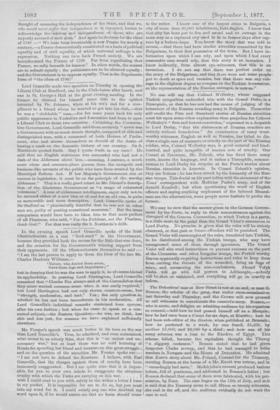Lord Granville made two speeches on Tuesday in opening the
Liberal Club at Bradford, one in the Club-house after lunch, and one in St. George's Hall at the great evening meeting. In the former he claimed for himself some title to the epithet invented by Dr. Johnson, when at his wit's end for a com- pliment to a friend whom he wanted to get into his club,—that he was a " clubbable " man,—for for some years back his only public appearance in Yorkshireand Lancashire had been to open a Liberal Club in those two counties. Criticising the Conserva- tive Government, Lord Granville said there certainly "never was, a Government with so much innate thought, composed of able and distinguished men, with a command of both Houses of Parlia- ment, who had shown themselves so devoid of the desire of leaving a mark on the domestic history of our country. Sir S. Northeote quoted Swift. May I quote Swift in my turn ? lie, said that no English statesman was successful who had not a dash of the Alderman about him,—meaning, I assume, a much more obese and common-place person than, the energetic and business-like servants of the public who have been created by the Municipal Reform Act. If her Majesty's Government aim at success in legislation, it must be on the principle of the worthy Alderman." That is a really good retort to Mr. Disrael's descrip- tion of the Gladstone Government as "a range of exhausted volcanoes." A row of aldermanio intelligences, eager only not to be accused either of a new idea or of zeal for an old one, is quite as memorable and more descriptive. Lord Granville spoke of Sir Stafford as "pharisaically thankful that he was not as other men are, guilty of passing sensational measures." But the truer comparison would have been to liken him to that most perfect of all Pharisees, who said "I'm the Publican, not the Pharisee, thank God]" For that was really Sir S. Northcote's drift.






























 Previous page
Previous page